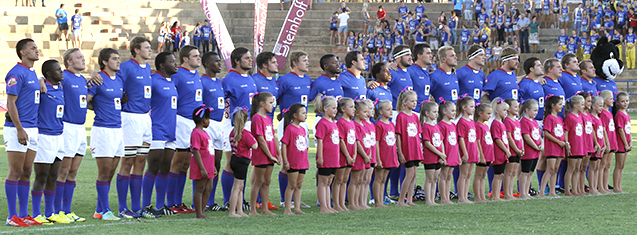
After scoring nine tries to none to establish a 57-0 win over the Central University of Technology’s (CUT) Ixias in round three of the 2015 Varsity Cup Rugby Tournament, the UFS Shimlas are now second on the overall log.
Despite thunder showers in Bloemfontein on the evening of Monday 23 February, the match at the CUT Rugby Stadium continued. Shimlas’ Arthur Williams opened the scoreboard early with the first try of the evening, after getting his hands on a loose ball to break through the CUT defense line. Only four minutes later, Shimlas’ flank Gerhard Olivier scored another try. Both of these tries were successfully converted by Niel Marais, putting Shimlas in a 16-0 lead within less than seven minutes.
By halftime, the Shimlas’ lead had increased to 39-0. Daniel Maartens started the second-half scoring for the UFS when he crossed the try line in the 46th minute to secure Shimlas’ seventh try. After another successful conversion kick by Marais, the scoreboard read 47-0.
The match began to lose its spark as handling errors and ill-discipline became the order of the day. CUT were reduced to 14 men for the second time in the match, when Boetie Makethlo was sent to the sin bin in the 75th minute for an infringement at the breakdown, inches away from his try line.
Maartens went over the try line again in the 78th minute, scoring Shimlas’ eighth try in the match and taking his team’s score beyond the 50 mark. Shimlas managed yet another try in the last minute, with Niell Jordaan diving over the try line for old time’s sake.
Although the Shimlas’ 2015 Varsity Cup started off with a 29-29 draw against the University of Pretoria’s Tuks in Bloemfontein, they returned the following week to clinch a 24-0 win against the University of Johannesburg at the UJ Stadium. Apart from Tuks, who is at this stage on top of the log, no team has scored against Shimlas thus far in the 2015 Varsity Cup.
Up next, Shimlas will face the Stellenbosch University’s Maties side at Shimla Park in Bloemfontein for round four of the tournament on Monday 2 March 2015.
Our Player that Rocks: Niell Jordaan
Shimlas’ point scorers:
Tries: Arthur Williams, Gerhard Olivier (2), Marco Klopper, Vuyani Maqina (2), Daniel Maartens (2), Niell Jordaan
Conversion kicks: Niel Marais 4